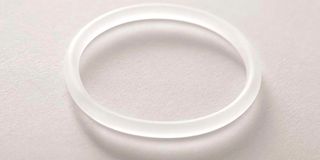We need the dapivirine ring for HIV prevention, say women

The Dapivirine ring for HIV/Aids prevention.
What you need to know:
- The World Health Organization in January last year recommended the use of the silicone vaginal ring, which contains an antiretroviral drug called Dapivirine, hence the name Dapivirine ring.
- In Africa, the ring is only available in South Africa and Zimbabwe.
More Kenyan women are willing to use the Dapivirine ring for HIV/Aids prevention and even pay for it despite it not being available at scale in the country, reveals a new study.
The study titled ‘The Value of a Ring to Women In Kenya: A Willingness-to-Pay’ was presented in May at this year’s INTEREST 2022 conference in Kampala, Uganda by Dr Urbanus Kioko of the University of Nairobi.
The World Health Organization in January last year recommended the use of the silicone vaginal ring, which contains an antiretroviral drug called Dapivirine, hence the name Dapivirine ring.
The recent research shows that 78 per cent of the participants said they were willing to use the ring and 83 per cent of those are willing to pay an average of Sh200 (1.86USD).
However, the ring is not available in the country.
“Married women appear to have the least interest in using the ring and are willing to pay the lowest amount for it while women with more education tended to lower interest in using the ring and opted to pay more,” said the study.
Dr Kioko and his colleagues’ study complements another recent study conducted in Africa that shows more young African women have a better adherence to the Dapivirine ring compared with the Oral Pre-exposure prophylaxis (PrEP) as a way of preventing HIV infection.
Presenting the findings in a recent science café organised by the Media for Environment Science Health and Agriculture, Prof Kenneth Ngure of the Jomo Kenyatta University of Agriculture and Technology said that in as much as adolescents prefer the ring to other forms of prevention, there is need to fast track and come up with strategies for delivery.
“We have to increase the range of service models and try to take advantage of pharmacies since they are ubiquitous. Home-based deliveries as well as tele-health models will help in widening the reach,” he said.
The flexible silicon ring can be used by women aged 16 and above who are at risk of being infected with HIV. To properly use the ring, it must be worn inside the vagina for a period of 28 days after which it should be replaced by a new ring.
The ring is made of silicone and is easy to bend and insert. The ring works by releasing the antiretroviral drug dapivirine from the ring into the vagina slowly over 28 days.
Prof Ngure said the side effects of the ring are only restricted to the vaginal area and are not severe, but he ruled out any possibility of cervical cancer as a side effect.
Despite the need for a variety of HIV prevention measures and researchers advocating for its use based on data from Lancet that shows the ring reduces HIV/Aids infections by 30 per cent, funding remains a challenge for countries like Kenya, which have high rates of HIV infection. Major funders in the HIV/Aids preventions have not outrightly given their stance on the support for roll-out of the Dapivirine ring.
In Africa, the ring is only available in South Africa and Zimbabwe.





